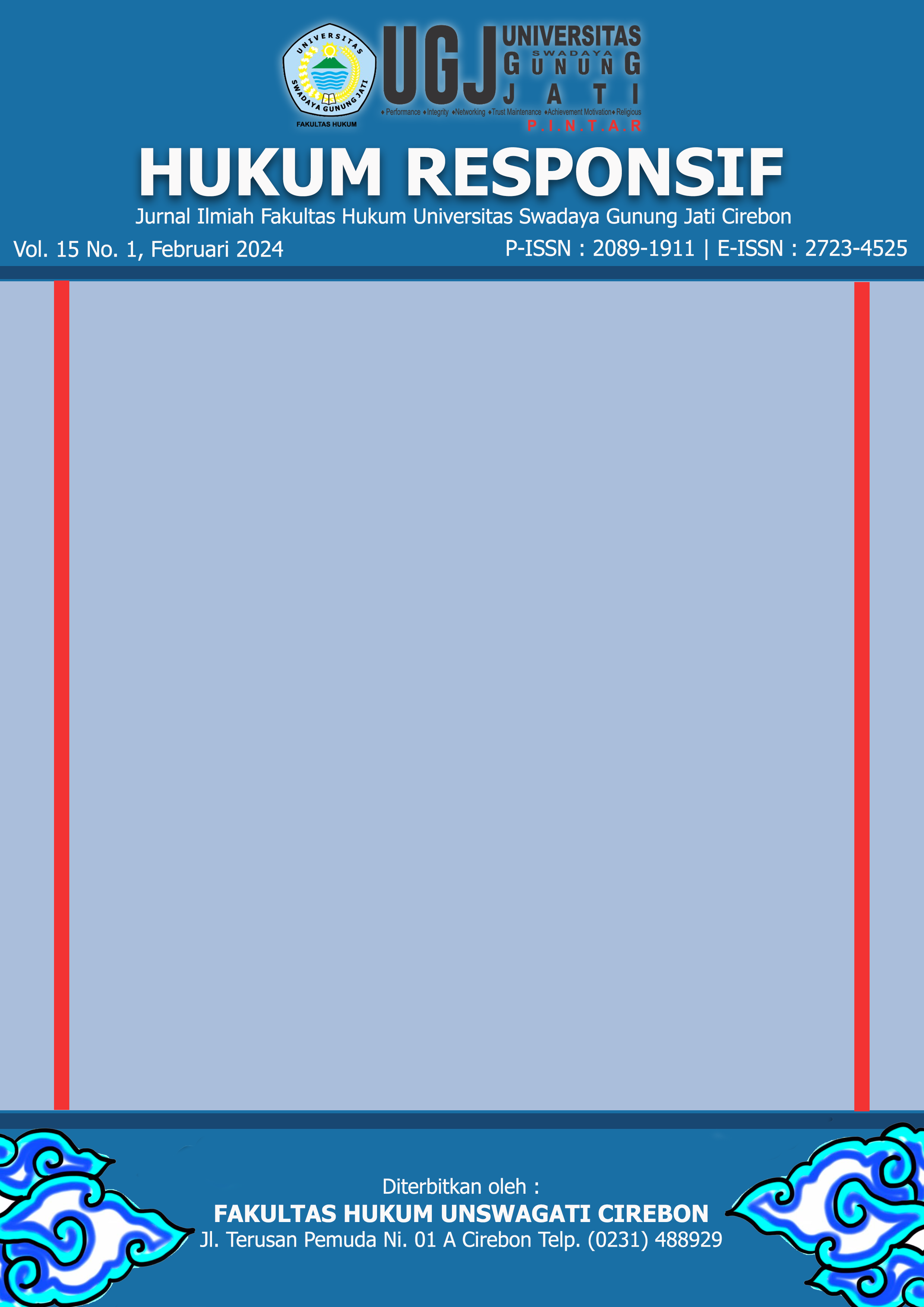MENGUAK KEKUATAN TERSEMBUNYI: HUKUM SEBAGAI MESIN KONTROL SOSIAL DAN STRATEGI MACHIAVELLIAN DALAM PERGULATAN KEPEMIMPINAN KONTEMPORER
DOI:
https://doi.org/10.33603/responsif.v15i1.8917Keywords:
Kepemimpinan Machiavellian, Hukum, Pengendalian Sosial, Pertimbangan EtikaAbstract
Jurnal ini melihat bagaimana hukum, dinamika masyarakat, dan strategi Machiavellian berinteraksi satu sama lain dalam bidang kepemimpinan modern. Narasi berkembang melalui analisis menarik tentang peran transformatif hukum sebagai penggerak perubahan sosial. Ini dikombinasikan dengan kompleksitas taktik kepemimpinan Machiavellian. Machiavelli percaya bahwa para pemimpin harus menggunakan perilaku manipulatif, dan analitis dalam upaya untuk memperolehdan mempertahankan kekuasaan. Penelitian ini meneliti bagaimana kekuatan ini bekerja sama dengan pengendalian sosial dan pertimbangan etika dengan memasukkan situasi dunia nyata dan konteks teoretis. Jurnal ini bertujuan untuk memberikan pemahaman mendalam tentang hubungan yang kompleks yang membentuk lingkungan kepemimpinan modern. Penelitian ini menggunakan pendekatan penelitian yuridis normatif karena termasuk dalam penelitian hukum doktrinal.
References
Auerbech, Jerold S. Justice Without Law?, (Oxford: Oxford University Press, 2002) hlm.6.
Aurelius, Ata Luon dan Anita Primastiwi. (2018). Pengaruh Norma Subjektif, Machiavellianisme, Kolektivisme, Dan Etika Terhadap Niat Melakukan Pengungkapan Kecurangan (Whistlebllowing). Jurnal Bisnisman: Riset Bisnis dan Manajemen Vol. 4, No. 1
Christie, Richard. Studies in Machiavellianism. New York: Academic Press, 2013.
Engle, Sally,. Getting Justice and Getting Even : Legal Consciousness among Working-Class Americans. Chicago: University of Chicago Press, 1990.
Fredrick Schauer, The Force of Law, (Cambridge: Harvard University Press, 2015) hlm.2.
Hamzah, Andi. Hukum Acara Pidana Indonesia. Diedit oleh Tarmizi. 2 ed. Jakarta: Sinar Grafika, 2017.
James Burnham, The Machiavellians: Defenders of Freedom. Ashland: Blackstone Audiobooks, 2013.
Jason J. Dahling. (2008) "The Development And Validation Of A New Machiavellianism Scale" Journal of Management #35, pp. 219-257 Version
Jeremy Waldron. The Law. New York: Routledge, 1990.
Kramer, D. Larry, The People Themselves: Popular Constitutionalism and Judicial Review. Oxford: Oxford University Press, 2005.
Lemons, Russel, Gobbles and Der Angriff. Kentucky: The University Press of Kentucky, 1994.
Leonard W. Doob, Gobble’s Principles of Propaganda. Kentucky: The University Press of Kentucky, 1994.
Niccolo Machiavelli. The Prince; Sang Penguasa, Trans. Natalia (Surabaya: Ecosystem Publishing, 2018.
Penticuff, Logan Taylor, "The Exploration of Machiavellianism". PhD diss., Eastern Kentucky University, Kentucky.
Tofiq, Tri Agung dan Dwi Mulyani. (2018). Anilisis Pengaruh Sifat Machiavellianisme¸ Etika Dan Tanggung Jawab Sosial, Faktor Situasional Dan Locus Of Control Terhadap Pengambilan Keputusan Etis Oleh Konsultan Pajak. SCIENTIFIC JOURNAL OF REFLECTION: Economic, Accounting, Management and Business, 1(4).
Tyler, Tom R., Why People Obey the Law. New Jersey: Princeton University Press, 2006.
Tyler, Tom R. Trust in the Law: Encouraging Public Cooperation with the Police and Courts. New York: Russell Sage Foundation, 2002.
Windha Aprillia. (2020) The Dark Triad and Ethical Behavior. Advances in Economics, Business and Management Research, volume 173.
Zamir, Eyal. Behavioral Law and Economics. Oxford: Oxford University Press, 2018.
Downloads
Published
Issue
Section
License
The Authors submitting a manuscript do so on the understanding that if accepted for publication, copyright of the article shall be assigned to Jurnal HUKUM RESPONSIF, Fakultas Hukum Universitas Swadaya Gunung Jati. Universitas Swadaya Gunung Jati as publisher of the journal. Copyright encompasses rights to reproduce and deliver the article in all form and media, including reprints, photographs, microfilms, and any other similar reproductions, as well as translations.
Jurnal HUKUM RESPONSIF, Universitas Swadaya Gunung Jati and the Editors make every effort to ensure that no wrong or misleading data, opinions or statements be published in the journal. In any way, the contents of the articles and advertisements published in Jurnal HUKUM RESPONSIF the sole responsibility of their respective authors and advertisers.














